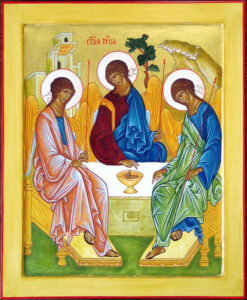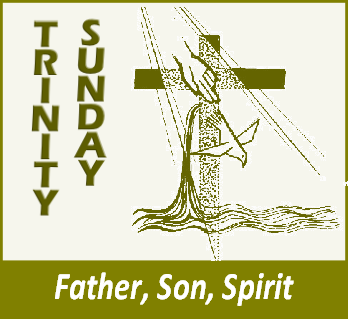30 May 2021
Ezekiel 17:22–24 2 Corinthians 5:6–10 Mark 4:26–34
One of the great classics of Byzantine iconography is the icon of the Trinity painted by a 15th century Russian monk. Rublev used an ancient image of the apparition of three angels to Abraham at the oak of Mambre (Genesis 18) to represent the doctrine of the Trinity. Through intersecting circles and vivid colours, blue, green, brown and purple, his icon evokes the perfect communion of love that exists between the three persons in the one Godhead. Employing a language only a great artist could create, this famous icon continues to captivate the imagination of Christians with its beauty and power.

The Trinity is the defining doctrine of our Christian faith, the central statement about the kind of God we believe in. We are baptized “in the name of the Father and of the Son and of the Holy Spirit” (Matthew 28:19). We begin our formal and informal prayers with this Trinitarian formula. According to George A Maloney, ‘[I]n the earliest centuries of Christianity theology was a mysticism about the indwelling Trinity, living within and transforming Christians into divinised children of God.’ Hence, belief in the Trinity is not just a dogma to be accepted in faith or a formula to be recited in our liturgy, but the generative and dynamic core of our Christian way of life.
Yet the great German theologian, Karl Rahner, was convinced that, for the majority of Christians, the doctrine had little or no impact on the day-to-day living out of their faith. If the doctrine of the Trinity is central to Christian faith, why has it had so little impact on our everyday lives. The reason lies in the language in which we learned, from our earliest years, to think and speak of God. Traditionally, God was seen as immutable being: unlimited, all sufficient, perfect, and far removed from the world of creaturely imperfection. The relationship between God and the world was presented as a one-way relationship. God, we learned in catechism class, could not be affected by anything that happens in the world. God was an unmoved mover. This understanding of God as unchangeable perfection is reflected in St John Henry Newman’s beautiful hymn, Abide with Me:
‘Change and decay in all around I see;
O thou who changest not, abide with me’.
This kind of language can make God appear remote or distant from us. But this is not the God revealed in the Bible – the birthing God of creation; the Spirit God drawing life out of chaos and enabling a universe of creatures to evolve and flourish; God, the Word incarnate, taking on and reshaping our human history. God’s closeness to us is particularly manifest in the life and ministry of Jesus of Nazareth. In him we meet a God who goes in search of men and women and rejoices when a lost son finds his way back to the house of his Father. The parable of the Prodigal Son (Luke 15:11-32) portrays God as a loving Father who responds to human decisions and is affected by them.
The God of the Bible is not remote, aloof, indifferent, self-enclosed, perfect Being but a loving Father who is interested in and cares for all creatures from the smallest to the greatest, a passionate and compassionate God, capable of being deeply moved by the sufferings of his creatures. In the words of Pope Francis, the Scriptures reveal a ‘God of Love who created the universe and generated a people, became flesh, died and rose for us, and, as the Holy Spirit, transforms everything and brings it to fullness’. This is the God who is Father, Son and Spirit.
Moreover, the doctrine of the Trinity is not just about God’s eternal being. It is as much about us as it is about God, about how God relates with us and how we are called and challenged to relate with one another. As the Australian theologian, Catherine La Cugna, states:
‘The life of God – precisely because God is triune – does not belong to God alone. God who dwells in inaccessible light and eternal glory comes to us in the face of Christ and the activity of the Holy Spirit… The heart of the Christian life is to be united to the God of Jesus Christ by means of a communion with one another [and with all creatures].’
Hence, the doctrine of the Trinity is profoundly relevant to our everyday lives for it is ultimately about what it means to be human persons created in the image of this God of Love. To be human means to be like the God who created us, the God in whom all creatures live and move and have their being, and who are intimately connected with one another. It means to live in relationships of love and respect, not only for our fellow humans, but for all God’s creatures with whom we share the gift of life. We are called to participate fully in the Trinitarian communion of Father, Son and Spirit through our loving communion with one another and, indeed, with all creation. And, as members of the Church, are called to be witnesses of this awesome destiny in a world thirsting for love.
Michael McCabe SMA, Cork, May 2021

